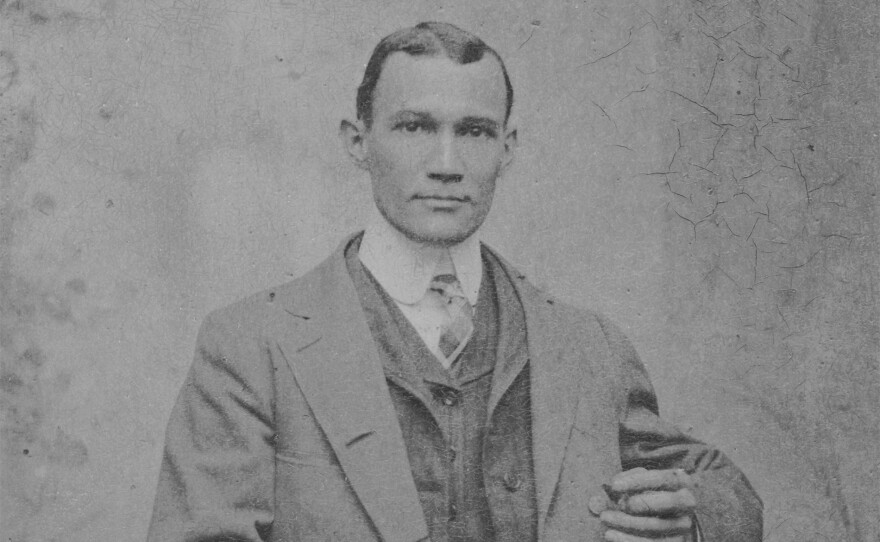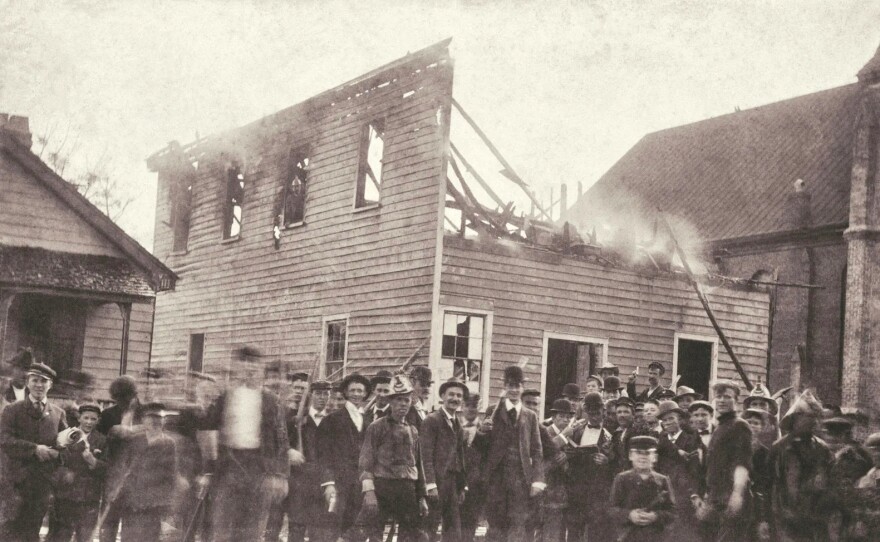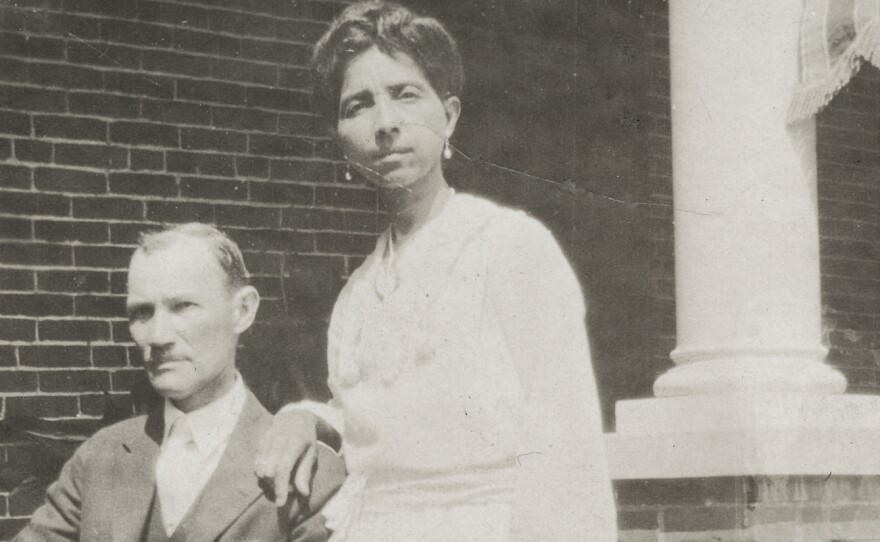Tuesday, Dec. 3, 2024 at 9:30 p.m. on KPBS TV / Stream now with the PBS app
“American Coup: Wilmington 1898” tells the little-known story of a deadly race massacre and carefully orchestrated insurrection in North Carolina’s largest city in 1898 — the only coup d’état in the history of the U.S. Stoking fears of “Negro Rule,” self-described white supremacists used intimidation and violence to destroy Black political and economic power and overthrow Wilmington’s democratically-elected, multi-racial government. Black residents were murdered and thousands were banished. The story of what happened in Wilmington was suppressed for decades until descendants and scholars began to investigate. Today, many of those descendants — Black and white — seek the truth about this intentionally buried history.
Filmmaker Quote:
“We didn't know anything about this story when we started, and most of America has never heard about it,” said filmmakers Brad Lichtenstein and Yoruba Richen. “It’s important to tell the history of one of America's most egregious racist and violent moments and also bring to light the stories of the descendants, Black and white, who are actively seeking truth and accountability more than 125 years after the coup and massacre.”
To create the documentary, the filmmakers interviewed leading scholars of the coup and its historical context. On-screen commentators include professors Carol Anderson (Emory), Glenda Gilmore (Yale), Robin D.G. Kelley (UCLA), Crystal R. Sanders (Emory), and journalist David Zucchino, author of the Pulitzer Prize-winning “Wilmington’s Lie: The Murderous Coup of 1898 and the Rise of White Supremacy,” among others. The filmmakers also interviewed and followed the stories of descendants, both Black and white, who describe their ancestors' connection to the coup and its enduring legacy in their lives.
Related: When White Supremacists Overthrew a Government
Grammy Award-winning musician, MacArthur “Genius” award recipient, and Pulitzer Prize-winner Rhiannon Giddens wrote an original song for the score and joins a cast of acclaimed actors, including Emmy-winner Keith David, in reading original accounts of the harrowing events of 1898. To bring the story to life, the film draws on hundreds of rarely-seen archival images and incorporates artwork in the form of black-paper silhouettes to illustrate additional scenes.
In the 1890s, Wilmington, North Carolina, was a thriving multi-racial community with a majority Black population. A prosperous port city, it offered plenty of opportunity for newly freed Black citizens, who competed with whites for skilled labor jobs as brick masons, blacksmiths and carpenters. There was a flourishing Black professional class of doctors, teachers and lawyers. Blacks owned property and businesses, invested in banks, served as police officers, and held public office in multiple levels of government, including the U.S. House of Representatives.
Related: Inside the Bygone World of Wilmington's Black Elite
But as the multi-racial government expanded and the social and economic status of Black citizens increased, so did the resentment of a group of white elites. They took measures to thwart the combined political power of Blacks and working class whites, who had united to form a “Fusion” government. Their strategy was to divide Blacks and whites by promoting fear, using racist propaganda, and running on a platform of white supremacy supported by the state’s largest newspaper.
One Black resident who rose to prominence was Alex Manly, editor and publisher of The Daily Record, Wilmington’s Black newspaper. On Aug.18, 1898, Manly published a rebuttal to a speech by a Georgia congressman’s wife, who argued that lynching was justified to protect white women from a falsely claimed “epidemic” of assaults by Black men. Manly’s editorial contended that relationships between Black men and white women were sometimes consensual, and that, for generations, white men had raped Black women with impunity. The editorial was widely reprinted and angered whites across the South. White businesses pulled ads, The Daily Record was evicted from its offices, and Manly received death threats.

Coup leaders promoted the falsehood that African Americans were arming themselves when, in fact, it was the white community that was preparing for war. Fearful that violence would erupt at any moment, a delegation of Black ministers went to Washington to ask President McKinley to intervene before tragedy struck, but worried about alienating white voters, he refused to send in federal troops.
Related Article: How to Cover up a Coup
On Nov. 8, 1898, Election Day, armed white men were out in the Wilmington streets to prevent Black men from voting. Through intimidation, voter suppression, and outright fraud, the white supremacists took control of the state legislature in a landslide. Too impatient to wait for the following year’s municipal election, architects of the coup issued what came to be known as the “White Declaration of Independence,” declaring that they would never again “be ruled by men of African origin.” After being forced to resign their positions at gunpoint in a coup d’état, local government officials, along with prominent Black citizens, were told to get out of town and never return.

On November 10, vigilantes rode through Wilmington looking for Alex Manly to lynch him, but he had already escaped. A growing mob burned the offices of The Daily Record, then posed for a photo in front of the ruins. Several dozen Black men were shot and killed (an accurate number will never be known) and Black women and children were terrorized, running into a nearby swamp and cemetery for refuge.
Following the white supremacist insurrection, many newspapers throughout the country reported the incident as a “race riot” and suggested that Black citizens were the aggressors. More than 2000 African Americans fled the city. Wilmington, which had a Black majority of 56% in the 1890s, became a majority-white city. In

1899, North Carolinians passed a Constitutional amendment requiring voters to pay a poll tax and take a literacy test unless a father or grandfather had voted before 1867 — effectively disenfranchising the Black population. No Black citizen from Wilmington served in public office again until 1972, and no Black North Carolinian was elected to statewide office for nearly 100 years. No one was ever prosecuted or held responsible for the violence.
The history of what happened in Wilmington was buried until descendants and scholars began to investigate half a century later. Centennial remembrances in 1998 brought together white and Black descendants for public events, sparking a full re-examination of the coup and its aftermath.
“What happened in Wilmington had the effect of putting the final nail in the coffin of democracy in North Carolina,” said historian Robin D.G. Kelly. “1898 was the culmination of a process that had begun in many states throughout the South. That is the end of Black voting rights, Black civil rights until the 1960s.”
Watch On Your Schedule: AMERICAN EXPERIENCE “American Coup: Wilmington 1898” will stream for free simultaneously with broadcast on all station-branded PBS platforms, including PBS.org and the PBS app, available on iOS, Android, Roku, Apple TV, Amazon Fire TV, Android TV, Samsung Smart TV, Chromecast and VIZIO. The film will also be available for streaming with closed captioning in English and Spanish.





